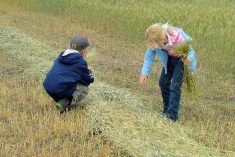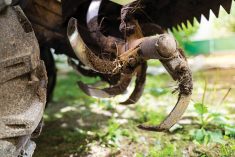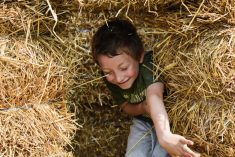When it comes to investing in your farm, one of the first things to come to mind is likely upgrading equipment or facilities.
However, while farm equipment routinely gets the maintenance it needs to operate properly, mental health typically does not receive the same attention. But it’s important to remember that an investment in your mental health is an investment in your farm operation. Because you can’t run a successful farm operation if you aren’t functioning at a healthy level yourself.
That’s the focus of Rooted in Resilience, a publication from Farm Credit Canada, which helps producers take actions to support their mental health and be better prepared to navigate all of life’s experiences.
Read Also

Manitoba crop insurance expands wildlife coverage, offers pilot programs
New crop insurance coverage is available to Manitoba farmers.
As the publication notes, we aren’t born with resilience, it is very much learned, but becoming more resilient can be empowering and offer personal growth. And producers who recognize, acknowledge and address the pressures they face will ultimately be better equipped to take action and not only survive but also thrive in stressful times.
Mental health dashboard
There’s no question that life on the farm comes with all kinds of advantages and excitement, but it also often comes with stress. Unpredictable weather, heavy workloads, market fluctuations, supply chain delays, pests and diseases and rising costs — the list of the challenges that producers face can go on and on.
The reality is the agricultural industry will always experience highs and lows. So, while it’s impossible to eliminate the stressors the industry is facing, it is possible to prepare for them. As Amir Georges Sabongui explains in Rooted in Resilience, “We can’t control what happens. We can control how it affects us.”
One of the best ways to identify how stress is affecting you is by taking a self-assessment of your mental wellness. Using a mental health dashboard, producers can determine their stress levels based on the following different colour areas:
GREEN: healthy, optimal
- Good sleep, good appetite and wanting to take care of your physical health
- Mentally clear with good concentration and focus
- Motivated and a good social network
YELLOW: reacting, stress
- Mild insomnia, unmotivated to exercise
- Easily distracted, avoidance, excessive worry
- Irritability, impulsiveness, discouraged
ORANGE: injured, burnout
- Moderate insomnia, drinking too much alcohol, binge eating
- Inability to concentrate, impaired decision-making, always negative
- Anger, anxiety, overwhelmed, avoiding social situations
RED: illness, depression, mental illness
- Constantly sleeping or periods of no sleep at all, excessive drinking, always sick
- Impaired judgment, paralyzed decision-making
- Apathy, hopelessness/helplessness, isolating from friends and family
If you notice any red lights in your self-assessment, it’s best to seek professional or clinical support.
Multi-generation farms
Another important topic addressed in Rooted in Resilience is the intertwining of family matters and business on the farm.
One of the unique aspects about life on the farm is how common it is to have three or four generations on one farm. Each generation brings different perspectives, values and mental and physical capacities to the family and farm business.
While those differences can be advantageous to the farm operation, multiple generations on one farm can also lead to complications when roles, finances and transition plans are unclear.
The issue of transitioning the farm business can often be a challenging and stressful process. There are a lot of emotions at play when it comes to transition planning, so using a third party can make it easier to have open discussions about the farm, personal values and financials. Keep in mind that alleviating ambiguity and guesswork is crucial for reducing stress, so make sure everything is documented.
“It’s all about trying to find the balance between focusing on the health of the family and the business,” says FCC business advisor Annessa Good.
A few other tips for multi-generation farm families include the following:
- Listen to others’ perspectives without judgment.
- Respect individual physical and mental capabilities.
- Write down family and operating agreements.
- Make positive, healthy changes together as a family.
Reaching out and reaching in
Rooted in Resilience notes that while stress and anxiety are high among farmers, they rarely reach out for help when they need it most.
In fact, a 2021 survey of farmer mental health found that 20 per cent of farmers reported moderate to severe anxiety disorders, which is significantly higher than the general Canadian population during the COVID-19 pandemic. And 76 per cent of farmers surveyed were classified as experiencing moderate or high perceived stress.
However, finding support is easier than coping with burnout while running a farm business. If you need help, don’t hesitate to reach out to friends, family or professionals. If you’re unsure where to start looking for help, contact 211, which is available in every Canadian province and territory to help find local mental health supports.
And if you suspect that someone is struggling, take the time to ask them if they’re okay — it may not be the easiest conversation, but it can make a huge difference and be the starting point that person needs.
Bear in mind that an angry reaction isn’t uncommon and is an avoidance coping behaviour. But it’s better to have someone angry with you for caring than to regret not reaching out to them.
Remember that investing in your mental health is just as important to your farm’s success and productivity as investing in equipment. After all, a healthy mind also supports a healthy farm.
To download a copy of Rooted in Resilience, please visit fcc-fac.ca/wellness. And for more information on mental health in agriculture, including links to resources and organizations, visit casa-acsa.ca/mental-health.















